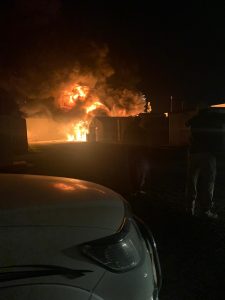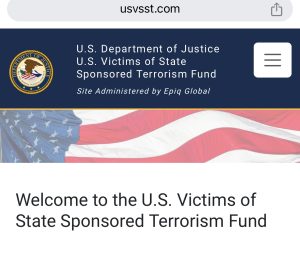When one person dies in a rocket attack, everyone injured in that rocket attack can make a claim for damages under the anti-terrorism law set forth at www.usvsst.com. The US Department of Justice has a website that explains the rights of US victims of state sponsored terrorism. US victims include contractors working under a contract which their employer has with the US Government.  These rights can be found at www.usvsst.com. It provides compensation to individuals or the personal representative of a deceased individual who holds a final judgment issued by the United States District Court, awarding the individual compensatory damages. The judgment must arise from active international terrorism for which a foreign state sponsor of terrorism was found not immune from the jurisdiction of US courts under the foreign sovereign immunities act (FSIA) and the individual must submit the applications found at the website, not later than 90 days after the date of obtaining the final judgment from the District Court.
These rights can be found at www.usvsst.com. It provides compensation to individuals or the personal representative of a deceased individual who holds a final judgment issued by the United States District Court, awarding the individual compensatory damages. The judgment must arise from active international terrorism for which a foreign state sponsor of terrorism was found not immune from the jurisdiction of US courts under the foreign sovereign immunities act (FSIA) and the individual must submit the applications found at the website, not later than 90 days after the date of obtaining the final judgment from the District Court.
Presently the funding through this website has paid about 25% of the awarded damages to contractors since 2016 since the fund does not have money every year to make disbursements. Attorneys’ fees are
 contingent on obtaining these benefits and has been limited to 25% of the benefits paid on usvsst disbursements. Fees can be higher where a law firm has to find and recover money from other third parties. A restrictive view of the ability of contractors to make a claim under this Act was recently taken by the United States Court of Appeals for the District of Columbia Circuit decided March 8, 2024. The case was Borochov vs. Islamic Republic of Iran and Syrian Arab Republic case number 22–7058.
contingent on obtaining these benefits and has been limited to 25% of the benefits paid on usvsst disbursements. Fees can be higher where a law firm has to find and recover money from other third parties. A restrictive view of the ability of contractors to make a claim under this Act was recently taken by the United States Court of Appeals for the District of Columbia Circuit decided March 8, 2024. The case was Borochov vs. Islamic Republic of Iran and Syrian Arab Republic case number 22–7058.
This law firm is committed to fighting terrorism and pursuing money damages for the contractors who suffered injuries where a fellow contractor paid the ultimate price for our freedom. Let us file a claim for you. For those of you that have retained us on the terrorism claim we will shortly contact you with a family member intake form because your family members who suffered emotional and psychological damages from your injuries are entitled to make a claim for compensatory damages. Family members include siblings, spouse, children, parents and each can get their own award if the contractor’s injuries had an emotional and psychological impact on that family member.
The court stated that for the district court to have subject matter jurisdiction, the injured person’s claim must fall within one of the FSIA‘s exceptions to foreign sovereign immunity. These exceptions are the sole bases for obtaining foreign jurisdiction over a foreign state in federal court. In a civil case the exception was codified by 28 USC §1605A which confers jurisdiction over a case “in which money damages are sought against a foreign state for personal injury or death that was caused by an active torture, extra judicial killing, aircraft, sabotage, hostage taking, or the provision of material support or resources for such act.”
In Borochov, there was no extra judicial killing so without that the injured individuals could not bring a claim against the Islamic state since there was no subject matter jurisdiction. Borochov is on Reconsideration for an En Banc hearing.
How would this play out, going forward absent a higher court reversal of this decision? It means that if one contractor dies in a rocket attack, then the other contractors injured in that attack can bring a claim for their damages, and the deceased contractor’s family can bring a claim as well.
This is easy to understand because in the February 15, 2021, bombing a contractor died, so those injured are able to make a claim under the anti-terrorism law.
What will be the court’s ruling if on another date of accident no one died from the bombing, but they died as a result of a heart attack suffered in the bombing. That may also allow the contractors to submit claims for compensatory damages under the anti-terrorism act.
Presently if no one died in the attack, the contractors cannot make a claim under the anti-terrorism law.
 Florida Injury Attorneys Blog
Florida Injury Attorneys Blog


